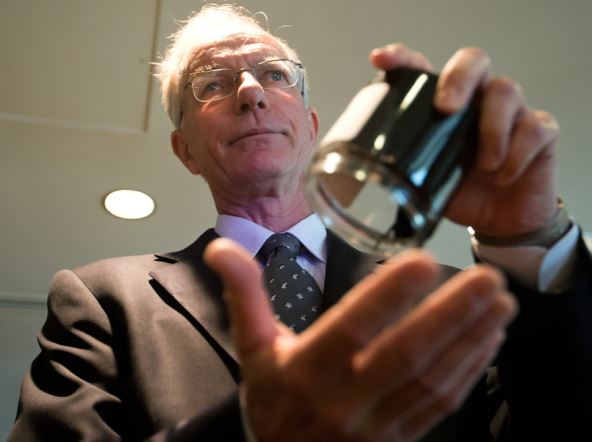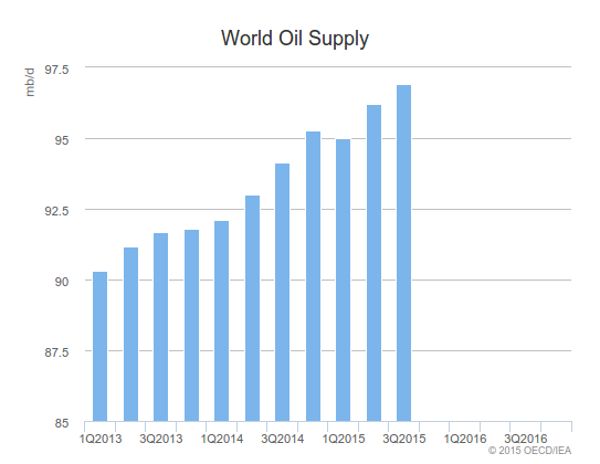Energy & Commodities
 Global energy security reels under the pressure of unfathomable geopolitics as the terrorist attack in Paris sparks worldwide fear of similar reprisals and a bloody shootout and hostage situation in a five-star Mali hotel exacerbates those concerns In an exclusive interview with Oilprice.com, Robert Bensh — managing director and partner at Pelicourt, a Western-owned oil and gas company navigating tricky conflict zones — discusses:
Global energy security reels under the pressure of unfathomable geopolitics as the terrorist attack in Paris sparks worldwide fear of similar reprisals and a bloody shootout and hostage situation in a five-star Mali hotel exacerbates those concerns In an exclusive interview with Oilprice.com, Robert Bensh — managing director and partner at Pelicourt, a Western-owned oil and gas company navigating tricky conflict zones — discusses:
• The terrorist threat to global energy security
• What ISIS is really after
• The bigger oil picture for ISIS
• Why Iraq can’t cope
• Why Iraqi Kurdistan has disappointed
• Why loose and shifting alliances spell geopolitical disaster
• Whether it’s all as doom-and-gloom as it seems…
Interview by James Stafford of Oilprice.com below:
James Stafford: In the aftermath of the terrorist attack in Paris and the shooting rampage and hostage situation at the Radisson Blu hotel in Bamako, Mali, how are we supposed to understand the role of energy in this equation; or the threat to global energy security?
Robert Bensh: We don’t have to force a connection here. Every modern day conflict — even if not immediately evident — has at its heart control over resources from oil and gas to water. Religion is but a symptom; a tool used to consolidate opinions, cement power and lure in new recruits.
James Stafford: How significant a role does oil play in funding the Islamic State?
Robert Bensh: I think we have to look at this from a much broader angle. While ISIS is earning significant income from oil sales, keeping in mind that no one really has a true estimate of volumes, the more dangerous aspect of this is that we are well beyond the point at which this is a crazy group of jihadists running amok.
James Stafford: You’re speaking about their level of organization and overall capabilities?
Robert Bensh: Exactly. It’s not their short-term energy disruptions we should be as concerned about. The bigger picture is that ISIS is trying to build a nation here — a fully functional state with its own oil and gas resources. And one of the most important aspects of their plan is to strangle Iraq’s oil revenues in a concerted effort to reduce Baghdad’s capabilities to defend its territory. At this rate, ISIS could become the next member of OPEC.
James Stafford: Is Iraq even remotely equipped to deal with this threat?
Robert Bensh: The latest disintegration of the Iraqi state came with the war in 2003. The follow-on prime minister — Nouri Al-Maliki — largely destroyed national institutions that would have presented a challenge to his Shi’ite rule. The weakened state that emerged from this has not been able to effectively combat the forward push of ISIS. And while the Kurds in Northern Iraq were a fundamental line of defense for Baghdad, that too is eroding as the Kurds have allowed themselves to become mixed up in disruptive internal politics that will undo all the work made to date towards independence. That development is not sitting well with investors who put a lot of money into what appeared to be a very stable and forward-moving Iraqi Kurdistan.
James Stafford: How does Russia fit into this equation?
Robert Bensh: It’s all connected; and for the energy sector, it all reverberates globally. Less attention will now be paid to Russia’s activities in Ukraine in light of the terrorist attack in Paris and the fear that this has sparked off an extended playing ground for the jihadists. As this happens, it is interesting to watch Russia’s relations with Turkey, and the additional insecurity Turkey adds to the conflict in Syria. Turkey’s game of playing all sides in the balance of power game is difficult to sustain. The downing by Turkey of a Russian jet conducting air strikes over northern Syria is just the first move in the new phase of this game, and analysts should probably start looking at ISIS oil sales to Turkey in their examinations of why Turkey downed a Russian jet at a time when the Russians were specifically targeting ISIS-controlled oil facilities and tankers.
James Stafford: What can we expect from Turkey?
Robert Bensh: President Erdogan has now consolidated his power thanks to his victory in the recent parliamentary elections. This means a clear Turkish policy of regime change for Syria. This in turn will be taken advantage of by ISIS. ISIS has already taken great advantage of Turkey’s double game in the form of boosting Syrian and Iraqi Kurds to keep ISIS back but trying to encourage Kurdish disunity by simultaneously attacking the Turkish Kurds. This is diminishing the Kurds’ ability to fight ISIS and also creating a very dangerous situation on the Turkish-Syrian border and across into Southeastern Turkey, where oil interests will suffer significantly. Amid the melee, Russia has been launching air strikes against ISIS in northern Syria, too close to the Turkish border for Erdogan’s comfort.
James Stafford: How can oil and gas investors possibly navigate this geopolitical terrain?
Robert Bensh: They can’t. No one can. Alliances are very unclear, and shifting. No one has a clear strategy because it’s not just about containing the ISIS advance. It’s about WHO is containing the ISIS advance — even after Paris. Will a Turkish-American air strike combo be the one to kick ISIS out of northern Syria? Or will the Russians? At the end of the day, there is one additional, untapped energy resource to be considered — the Levant Basin. This is where Israel has made game-changing gas finds that will render it energy independent and much more powerful. This is where Lebanon will eventually start exploring, if its political standoff is ever resolved, and if ISIS doesn’t upset these plans. What is rarely talked about is Syria’s unexplored portion of this highly promising basin. Whoever ends up in power in Syria will end up with this — the longer game.
James Stafford: Is it all as doom-and-gloom as the mainstream media portrays it?
Robert Bensh: That is always a matter of perspective. It’s always important to remember that the Middle East has been in a state of conflict since time immemorial and most likely will be for our lifetimes. It reaches us today in different ways, through the proliferation of various globalized media sources. As such, it always seems to be on our doorstep. At the same time, this same globalization in many ways aids the proliferation of terrorism as a new form of conflict. Whether it is ‘doom-and-gloom’ is a matter of personal perception. But any way you look at it, these are dire straits out of which no government has a clear path.
James Stafford: What advice would you give investors today about venturing into the oil and gas sector outside of North America?
Robert Bensh: Only invest in management that has a certain geopolitical foresight. Oil and gas men tend to be short-sighted — like most other people. Just because you can make a play work in the U.S does not mean you will succeed in a foreign country in this day and age. Geopolitical insight is paramount to success, and while no one will have all the answers, good management will at least be prepared for a number of eventualities.
Article Source: https://oilprice.com/Interviews/ISIS-Turkey-And-Oil-The-Bigger-Picture-Interview-With-Pelicourt.html
Part 1: The Crude Flood Cometh… and Taketh
What’s ahead for the oil market in 2016: rally or ruin?
Unfortunately, the answer to that question isn’t as easy as you might think.
Had you asked me a year ago, I wouldn’t have given it a second thought before telling you that it’s simply a matter of when production destruction would take place.
After all, the cure for low oil prices is low oil prices.
However, the problem is that even after 18 months of falling oil prices, we’re only now starting to see U.S. oil…
All this talk and turmoil and noise and movement and desire is outside of the veil; within the veil is silence and calm and rest. ~ Bayazid Al-Bistami
On the 19th of this month, two articles were published at the same time, one stating that oil could go to $26 and the other stating that oil is ready to trade to $80. Which one is it going to be, $26 or $80 and how is the average Joe going to be able to discern which one is a depiction of what lies ahead. This is the problem with today’s mass media, in their quest to attract eyeballs, bombastic and often conflicting articles are published simultaneously. One almost feels that most of the major sites have only one agenda, quantity over quality. The idea is to use emotions, Greed or Fear to trigger a reaction. Whether the data supporting the hypothesis is valid or not, appears to be irrelevant. Perhaps this is why more American drink coffee daily than invest in the markets.; over 50% of the public is still sitting on the sidelines.
Psychology is probably the simplest, most misunderstood and most underutilized tool when it comes to trading. The first rule of mass psychology dictates that one put aside one’s emotions. You have to cut the power of these useless forces. It is not easy, and it never becomes automatic. You have to fight it, but you know you are close to doing something right when you not overly confident about the decision you are going to make. The second factor is to get rid of the noise factor; use mass media as a source of entertainment or provide you information on what you should not be doing.
Having said, that, let’s us attempt to shed some light on what is going on. Let’s start off with the fundamentals; for the record we do not place too much emphasis on fundamentals. Fundamental data is presented in a standard format, so anyone with access to it can draw the same conclusion. Thus it negating the edge it is supposed to give an investor. However, if you combine that with Mass psychology and or technical analysis, the outcome improves considerably.
On the fundamental side, the IEA states that it expects oil to trade to $80 by 2020. The IEA also made the following statement.
“The IEA expects all the production in the United States to go down half a million barrels in next year – 500,000 barrels a day. I expect to go down a million barrels a day in 2016 and another million barrels in 2017,” he said. “On top of that, I see demand increasing by another 2 million barrels over the next 2 years. So that’s already a 4 million barrel swing over the next 22 months. That’s going to make a difference with oil prices.”
The IEA is notorious for painting a picture that in many instances bears no resemblance to reality. Fundamentals tend to give you a rear view look at what is going on. By the time, the fundamentals improve the market has moved and is trading well of its lows.
If we combine both those articles together, then we draw closer to the truth. We have been stating for some time that we expect crude oil to trade within a wide range, barring some unforeseen events such a full-fledged war in the Middle East. In fact, this is what we said to our subscribers recently.
Oil is expected to continuing trading in a wide range (33-60), but will face bouts of resistance at 50.00. Once oil manages a weekly close above 50, it will widen the range to 60-65 ranges. ~ Market Update, Nov 1st, 2015.
What’s next for Crude oil?
Crude came within striking distance of $50.00, trading as high as $48.36, before it pulled back. It looks set to test its lows again, with a possible overshoot, to the 32.00 ranges. The ideal set up would be for oil to put in a higher low or generate a positive divergence signal it drops to new lows.
From a technical perspective, oil needs a weekly close above 50.00 to indicate higher prices. A monthly close above 60 on a monthly basis will indicate that a test of $75.00 is in the works. We expect oil to trade in this range for the next several months unless the situation heats up in the Middle East.

I almost always pause, knowing there isn’t a quick black-and-white answer.
So hedging my knowledge I reply, “While anything is possible the likelihood of a cut occuring is slim”… CLICK HERE for the complete article

But recent government decisions affecting the Keystone XL and Northen Gateway pipelines, Black believes his proposal is the best option for Alberta oil exports…
CLICK HERE for the complete article















